UNITAR Afghanistan Fellowship Programme 2016 Cycle Finishes Strong in Hiroshima
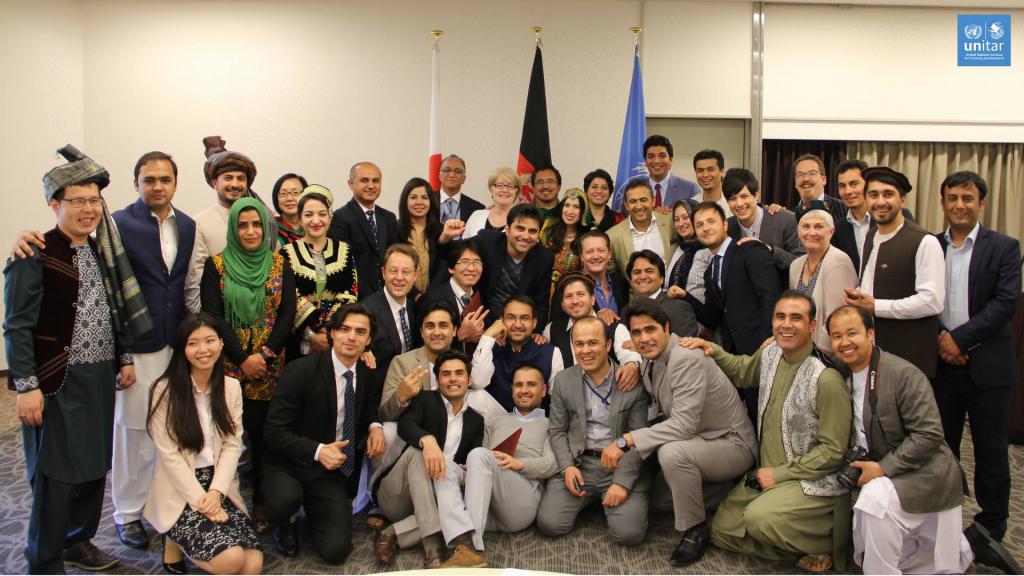 18 May 2017, Hiroshima, Japan -- The UNITAR Afghanistan Fellowship Programme: Inspiring Transformation concluded with Workshop III, held over two weeks in Hiroshima from 17 to 29 April 2017. The Fellowship, which teaches project development, management, and leadership skills, honed Fellows' by-then extensive knowledge by focusing on team development, change management, conflict resolution, leading project implementation, and ethics and values in relation to social entrepreneurship, among other topics. Over the two weeks, the Fellows engaged in interactive training sessions, designed to give them the skills and knowledge to develop strong teams and effective implementation plans. As they have throughout the programme, the 27 Fellows received expert guidance from Coaches and Afghan Resource Persons, as well as an international team of Mentors and Resource Persons, along with UNITAR staff.
18 May 2017, Hiroshima, Japan -- The UNITAR Afghanistan Fellowship Programme: Inspiring Transformation concluded with Workshop III, held over two weeks in Hiroshima from 17 to 29 April 2017. The Fellowship, which teaches project development, management, and leadership skills, honed Fellows' by-then extensive knowledge by focusing on team development, change management, conflict resolution, leading project implementation, and ethics and values in relation to social entrepreneurship, among other topics. Over the two weeks, the Fellows engaged in interactive training sessions, designed to give them the skills and knowledge to develop strong teams and effective implementation plans. As they have throughout the programme, the 27 Fellows received expert guidance from Coaches and Afghan Resource Persons, as well as an international team of Mentors and Resource Persons, along with UNITAR staff.
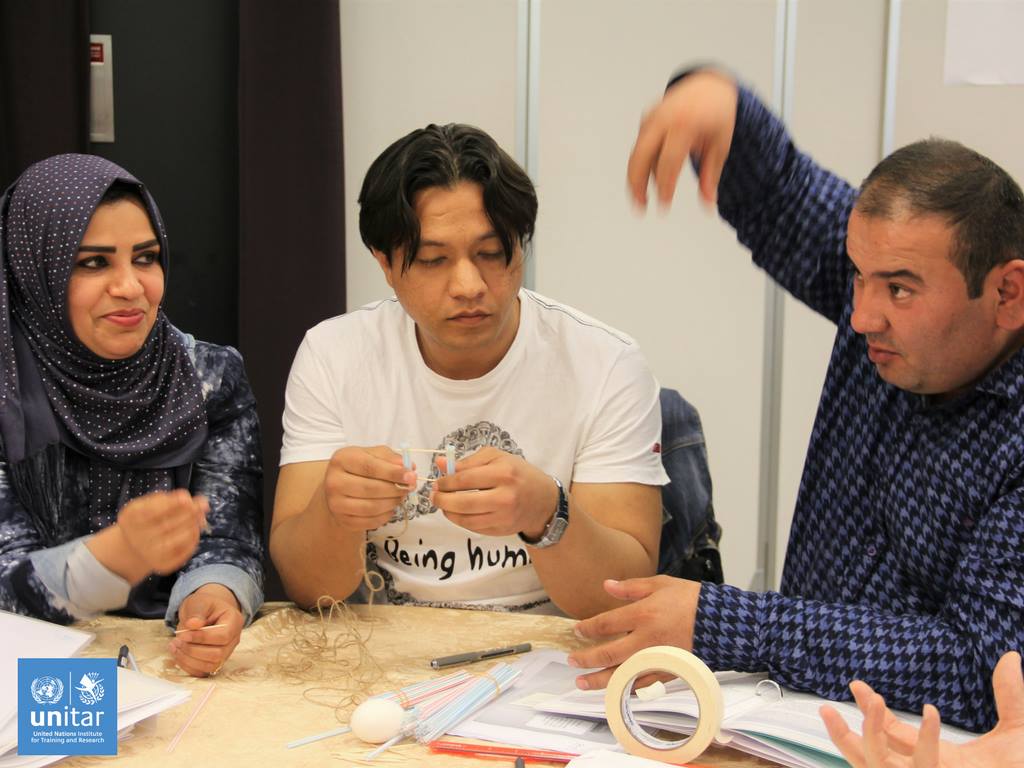 Taking advantage of its location, the Workshop began with a visit to the Hiroshima Peace Memorial Museum and Park. At the Museum, Fellows listened to a hibakusha's presentation before heading into the exhibit itself. The group also went on a tour of hibakujumoku (trees that survived the atomic bombing), led by Green Legacy Hiroshima Co-Founder Nassrine Azimi. Some participants were so taken by hibakujumoku that they were later given seeds to take back to Afghanistan, hopefully to be planted in a garden with other trees native to Afghanistan, symbolizing nature's ability to live in harmony.
Taking advantage of its location, the Workshop began with a visit to the Hiroshima Peace Memorial Museum and Park. At the Museum, Fellows listened to a hibakusha's presentation before heading into the exhibit itself. The group also went on a tour of hibakujumoku (trees that survived the atomic bombing), led by Green Legacy Hiroshima Co-Founder Nassrine Azimi. Some participants were so taken by hibakujumoku that they were later given seeds to take back to Afghanistan, hopefully to be planted in a garden with other trees native to Afghanistan, symbolizing nature's ability to live in harmony.
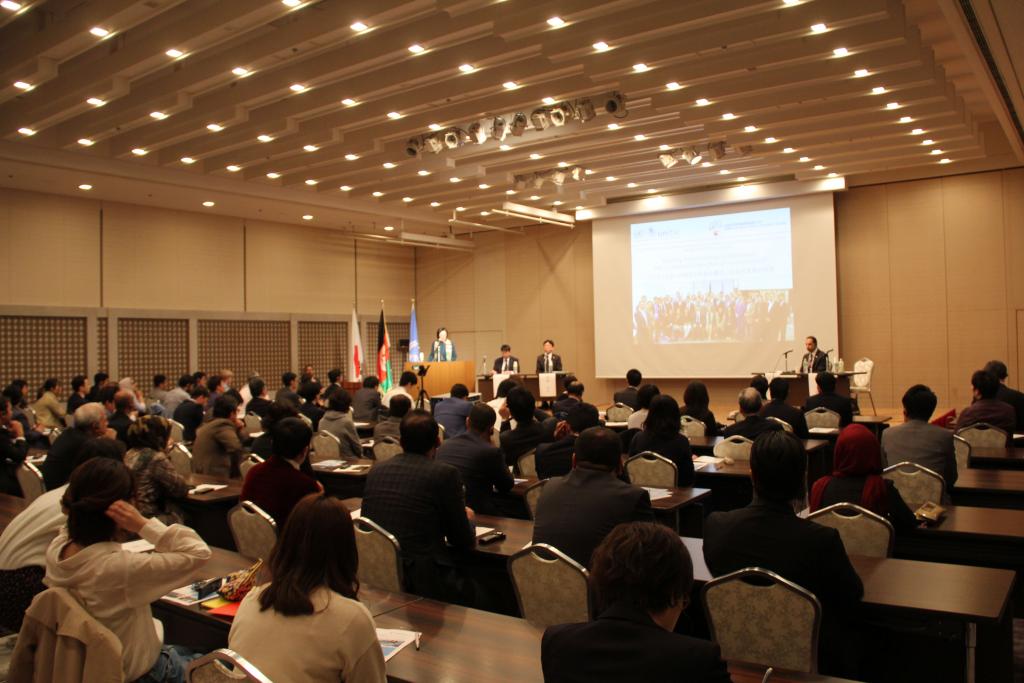 The Japanese Ambassador to Afghanistan, H.E. Mitsuji Suzuka, visited the Fellows during the workshop and held a round-table discussion in a local language of Afghanistan with the Fellows over lunch. He also gave a keynote speech as part of the 90th UNITAR Public Session, titled "Inspiring Transformation in Afghanistan: The Current and Future Role of Japan’s Support"; the Public Session was organised in collaboration with the Institute for Peace Science at Hiroshima University. First Secretary and Consul Mr. Ahmad Bashir Ghafoori, from the Embassy of Afghanistan in Tokyo, also engaged with the Fellows and gave welcome remarks during the Public Session. A courtesy call was made together with Ambassador Suzuka and First Secretary Ghafoori to the Governor of Hiroshima, H.E. Hidehiko Yuzaki, by several of the Afghan Coaches and Resource Persons.
The Japanese Ambassador to Afghanistan, H.E. Mitsuji Suzuka, visited the Fellows during the workshop and held a round-table discussion in a local language of Afghanistan with the Fellows over lunch. He also gave a keynote speech as part of the 90th UNITAR Public Session, titled "Inspiring Transformation in Afghanistan: The Current and Future Role of Japan’s Support"; the Public Session was organised in collaboration with the Institute for Peace Science at Hiroshima University. First Secretary and Consul Mr. Ahmad Bashir Ghafoori, from the Embassy of Afghanistan in Tokyo, also engaged with the Fellows and gave welcome remarks during the Public Session. A courtesy call was made together with Ambassador Suzuka and First Secretary Ghafoori to the Governor of Hiroshima, H.E. Hidehiko Yuzaki, by several of the Afghan Coaches and Resource Persons.
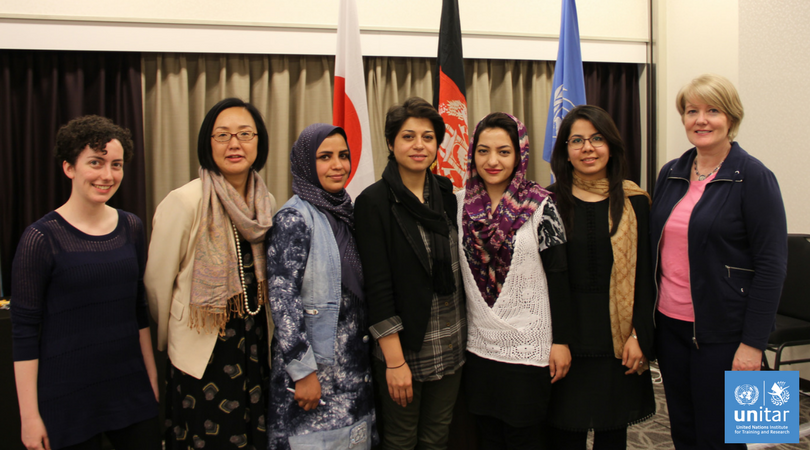 A lively discussion also took place between the women of the Fellowship, who discussed challenges and opportunities to empower women in Afghanistan and what role the UNITAR Hiroshima Office and the Afghanistan Fellowship can play therein. With more than 70 female alumni, there are many opportunities to create formal and informal support networks, increase female participation in the Fellowship and other capacity-building programmes, and provide specific training to support gender equality and empowerment.
A lively discussion also took place between the women of the Fellowship, who discussed challenges and opportunities to empower women in Afghanistan and what role the UNITAR Hiroshima Office and the Afghanistan Fellowship can play therein. With more than 70 female alumni, there are many opportunities to create formal and informal support networks, increase female participation in the Fellowship and other capacity-building programmes, and provide specific training to support gender equality and empowerment.
Workshop III concluded with the Fellows presenting their polished and completed group project proposals, which address contemporary issues in Afghanistan, ranging from reducing food shortages through community philanthropy in remote villages, creating an agricultural input support shop to provide provincial farmers with access to quality goods to boost their farming, to developing a vocational training support system to build youth capacity in the regions, to developing various training programmes for staff. With the final presentation, it was clear to everyone involved how far the Fellows had come since they began the programme last November.
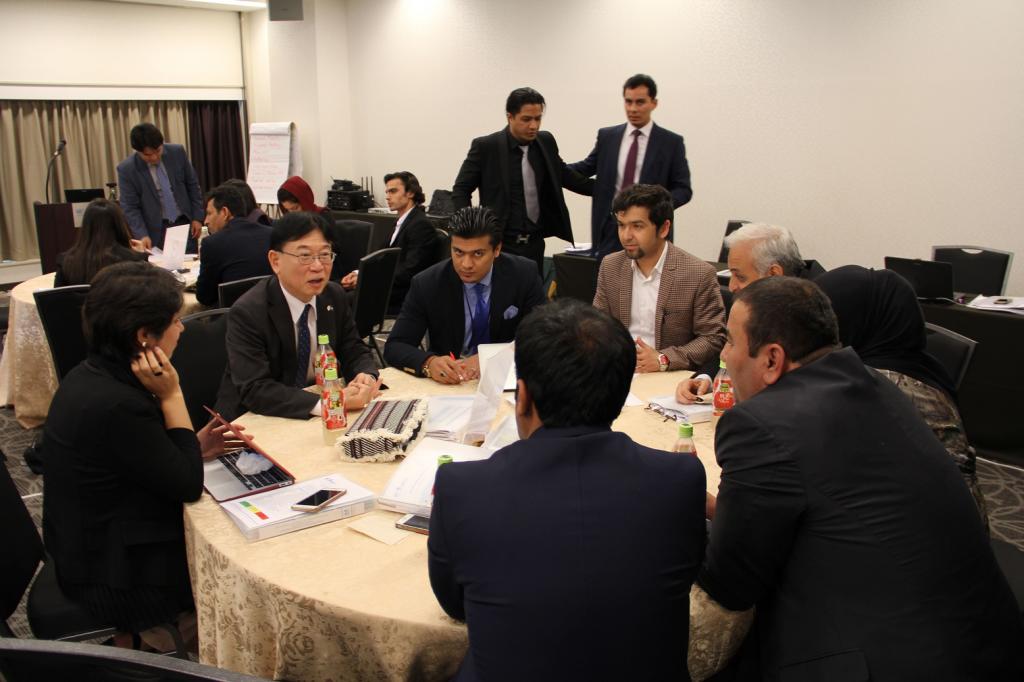 The workshop was led by key Resource Persons: Ms. Shona Welsh, Principal Consultant, Welsh Consulting; Dr. David Eaton, Professor, University of Texas at Austin; and Dr. Michael Fors, Executive Leader, Microsoft Corporation. Several mentors also delivered training sessions in their personal capacity, including: Mr. CP Tham, Senior HR Business Partner, Boehringer Ingelheim, and Ms. Jennifer Fox, Budget Advisor, US Department of the Treasury.
The workshop was led by key Resource Persons: Ms. Shona Welsh, Principal Consultant, Welsh Consulting; Dr. David Eaton, Professor, University of Texas at Austin; and Dr. Michael Fors, Executive Leader, Microsoft Corporation. Several mentors also delivered training sessions in their personal capacity, including: Mr. CP Tham, Senior HR Business Partner, Boehringer Ingelheim, and Ms. Jennifer Fox, Budget Advisor, US Department of the Treasury.
The UNITAR Hiroshima Office would like to thank all its partners, in particular, the Independent Administrative Reform and Civil Service Commission, the Afghan Civil Service Institute (ACSI), the Ministry of Finance of Afghanistan, the Embassy of Japan in Afghanistan, the Embassy of Afghanistan in Tokyo, Hiroshima Prefecture, Hiroshima City, Microsoft Corporation, and the University of Texas at Austin. We would also like to thank the many individuals, in Afghanistan and around the world, who support the Fellowship, in their roles as Resource Persons, Mentors, Afghan Resource Persons, and Coaches.
Photos in order: Workshop III Group Photo; Fellows undertaking teamwork; 90th UNITAR Public Session; Women of the Fellowship 2016 Cycle; Japanese Ambassador to Afghanistan H.E. Suzuka talking with Fellows.
For more information, please visit the UNITAR Afghanistan Fellowship Programme page.

